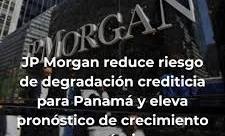JP Morgan throws cold water on Panama celebrations

While Panama celebrated the Supreme Court ruling that annulled the concession contract to First Quantum Minerals (FQM) in Panama, the investment bank JP Morgan warned about the economic difficulties that the country could face.
“Panama could be subject to a profound and negative impact on its medium-term growth prospects and, by extension, on fiscal ones. “While there is much uncertainty ahead, possibly lingering until the May election, it seems safe to say that some damage has already been done,” the company wrote in an analysis to investors.
For more than a month, environmental groups, activists, young people in defense of the environment, and citizens in general have led the largest protests in the country in decades against the Government’s contract with the mine approved by the National Assembly.
Worker groups such as the Construction Workers Union (Suntracs) and the teachers’ union, Asoprof, have also blocked streets in the capital and the main highways throughout the country to demand the closure of FQM.
JP Morgan highlights that these demonstrations have already had a substantial economic impact on the country’s finances, causing large losses in the tourism and hospitality sectors, among others and it warns that this could only be the beginning.
“We expect gross domestic product (GDP) to contract this quarter and enter 2024 facing an uphill battle,” the firm wrote, adding that its concerns go “beyond a year of poor growth.” “Our main concerns are that the country could suffer a continued decline in its growth in the medium term and an erosion of its public finances.”
JP Morgan highlights that the copper mine represents approximately 4% of the country’s GDP and its closure will have a substantial impact on government revenue and the GDP will contract. Although they foresee a growth of 3.5% year-on-year, they indicate that the debt/GDP ratio would be on a marked upward trend.
In addition, the firm hopes that the decision will have an impact on foreign direct investment, as external investors question whether the country is a safe place to invest: “We believe that the damage has already been partly inflicted, as investors “They will probably question the country’s institutional framework, which will affect investment, which is an important component of growth.”
In any case, the perspectives presented by JP Morgan may be somewhat more optimistic than the real situation. Many of the company’s assumptions appear based on the assumption that the Government and FQM could reach an agreement that would allow the mine to continue operating.
“We continue to believe that the most likely outcome is for the two parties to return to the negotiating table and seek a mutually viable solution. It is also worth noting that if the contract is not renewed, FQM will most likely resort to international arbitration, where the country could be held liable for billions of dollars,” they wrote.
If that does not happen, that is, if the contract is not renewed, JP Morgan predicts that FQM will appeal to international arbitration, where the country “could be held responsible for billions of dollars (8 or 9).” However, it recognizes that this will depend on whether the annulment of the contract “was entered into with the appropriate legal basis and in favor of the public interest or not, according to Article VIII of the International Treaty to Promote and Protect Investments between Panama and Canada.”
But, the company failed to take into account that the government recently approved a moratorium on all mining concessions, meaning negotiating with FQM may not be a viable option under Panamanian law.
In the scenario of permanent closure of the mine, JP Morgan predicts a rapid economic impact, as it projects that Panama will suffer a downgrade of the agencies’ credit rating. This, in turn, will make it more expensive for the country to borrow money and finance its current fiscal deficit.





